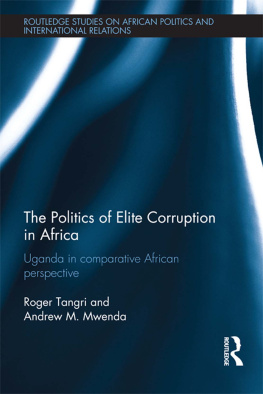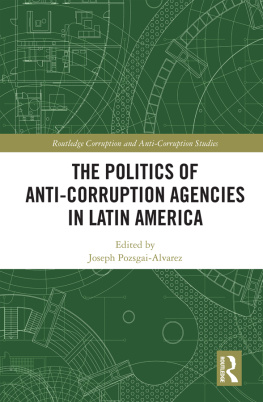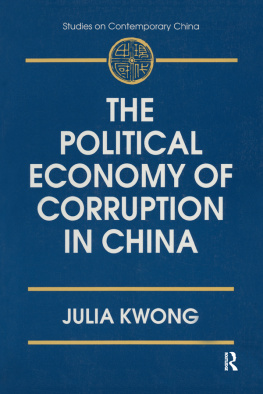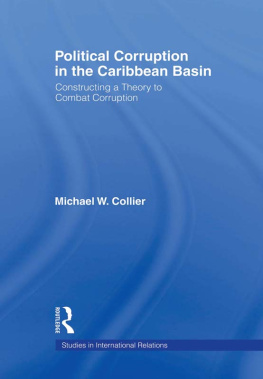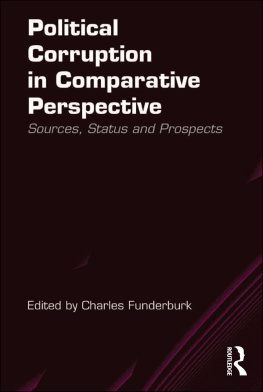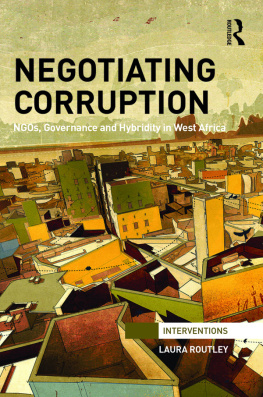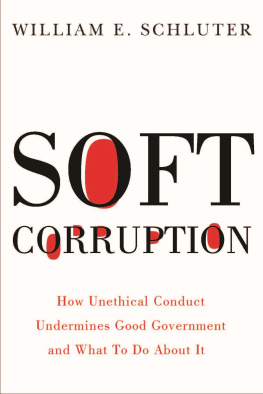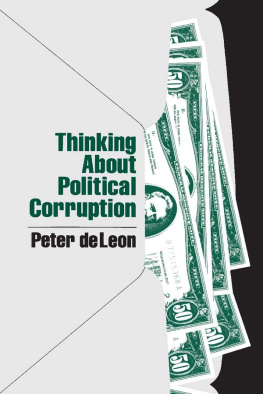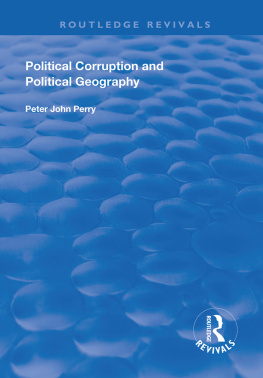The Politics of Elite Corruption in
Africa
This book considers the causes of high-level state corruption as well as the political constraints of countering corruption in Africa. It examines elite corruption in government as well as in the political and military spheres of state activity, and focuses on illegal behaviour on the part of state and non-state actors in decision-making.
Situating corruption and anti-corruption within a political framework, this book analyses the motivations, opportunities and relative autonomy of state elites to manipulate state decision-making for personal and political ends. Based on detailed case studies in Uganda, the authors focus on corruption in the privatization process, military procurement, foreign business bribery, illegal political funding, and electoral malpractice. The book examines why anti-corruption institutions and international donors have been constrained in confronting this executive abuse of power, and discusses the wider relevance of Uganda's experience for understanding elite corruption and anti-corruption efforts in other African countries.
The Politics of Elite Corruption in Africa will be of interest to students and scholars of African politics, African political economy, development studies, corruption and government.
Roger Tangri is a visiting scholar in the Center for African Studies at Stanford University, USA.
Andrew M. Mwenda is the founder and managing director of The Independent, a current affairs news magazine in Uganda.
Routledge studies on African politics and international relations
Edited by Daniel C. Bach, Emile Durkheim Centre for Comparative Politics and Sociology, Sciences Po Bordeaux.
1 Neopatrimonialism in Africa and Beyond
Edited by Daniel Bach and Mamoudou Gazibo
2 African Agency in International Politics
Edited by William Brown and Sophie Harman
3 The Politics of Elite Corruption in Africa
Uganda in comparitive African perspective
Roger Tangri and Andrew M. Mwenda
The Politics of Elite Corruption
in Africa
Uganda in comparative African perspective
Roger Tangri and Andrew M. Mwenda
First published 2013
by Routledge
2 Park Square, Milton Park, Abingdon, Oxon OX14 4RN
Simultaneously published in the USA and Canada
by Routledge
711 Third Avenue, New York, NY 10017
Routledge is an imprint of the Taylor & Francis Group, an informa business
2013 Roger Tangri and Andrew M. Mwenda
The right of Roger Tangri and Andrew M. Mwenda to be identified as authors of this work has been asserted in accordance with sections 77 and 78 of the Copyright, Designs and Patents Act 1988.
All rights reserved. No part of this book may be reprinted or reproduced or utilized in any form or by any electronic, mechanical, or other means, now known or hereafter invented, including photocopying and recording, or in any information storage or retrieval system, without permission in writing from the publishers.
Trademark notice: Product or corporate names may be trademarks or registered trademarks, and are used only for identification and explanation without intent to infringe.
British Library Cataloguing in Publication Data
A catalogue record for this book is available from the British Library
Library of Congress Cataloging-in-Publication Data
Tangri, Roger K.
The politics of elite corruption in Africa : Uganda in comparative African perspective / Roger Tangri and Andrew M. Mwenda.
pages cm
Includes bibliographical references and index.
1. Political corruption-Uganda. 2. Elite (Social sciences)-Uganda. I. Title.
JQ2951.A56C675 2013
320.96761-dc23
2012047361
ISBN: 978-0-415-64403-7 (hbk)
ISBN: 978-0-203-62647-4 (ebk)
Typeset in Times New Roman
by Wearset Ltd, Boldon, Tyne and Wear
Contents
Corruption has always been a subject of fascination. Everywhere corruption scandals have aroused much interest. Yet until very recently, corruption has not been the focus of much analytical attention. Scholars devoted little effort to understanding or even describing it. For many years, international donors over-looked cases of high-level corruption especially in politically favoured developing countries. In most African countries, where authoritarian governments prevailed until the 1990s, and where a free and active media was largely absent, public discussion of corruption was rarely contemplated.
Since the 1990s, however, corruption in Africa has come under increasing attention. Partly, the ending of the Cold War has meant that favoured African governments are not protected any longer from Western government criticism for acts of wrongdoing. Partly, international financial institutions (IFIs) have assumed great importance in economic development policy as a result of ubiquitous structural adjustment programmes, which have resulted, at least in terms of rhetoric, in growing calls for better governance and less corruption in the administration of economic reforms. Partly as well, some degree of political liberalization has occurred throughout Africa, which has led to corrupt practices being exposed by opposition parties, civil society, and particularly by an emerging independent media.
Scholars have also belatedly begun to examine the corruption phenomenon in African countries. But corruption is difficult for researchers to investigate. Much corruption is clandestine and lies hidden from public view. Many corruption cases are not publicized in the media and do not even appear before the courts. Obtaining reliable information is a problem. Moreover, it can be dangerous to seek to uncover corruption cases, especially those involving highly placed politicians, public officials, military generals and prominent businessmen.
In the following chapters we indicate the sources of our data on corruption in our Uganda case study, although the names of our respondents remain unmentioned. We have been able to overcome to some extent the multiple data obstacles that have impeded researchers on corruption elsewhere in Africa. We have gained access to many unpublished documents in the writing of this book. We have also interviewed and held discussions with many politicians, government officials, military officers, businesspeople and donor representatives. However, even in Uganda, which has a relatively open media climate, conditions are changing to the detriment of those working on such sensitive subjects as the ones dealt with in this study. Nonetheless, we hope our Uganda study will have important relevance for the study of corruption elsewhere in Africa.
In this work we focus on high-level state corruption in sub-Saharan Africa with special reference to Uganda. We are concerned with elite rather than petty corruption. We examine how both state and non-state actors have engaged in corrupt transactions at the higher levels of the African and Ugandan state. In particular, we show how elite corruption involves the manipulation of state decision-making to serve private and political purposes. We also examine the politics of curbing and controlling such corrupt actions. In particular, we argue that anti-corruption initiatives have proven largely ineffective, partly because they have been manipulated by political rulers and partly because civil society and international donors have been constrained in confronting the abuse of power. It is evident therefore that our analysis of corruption and anti-corruption is situated within a political framework that examines the exercise of power, as well as interactions principally between state elites and international donors.

